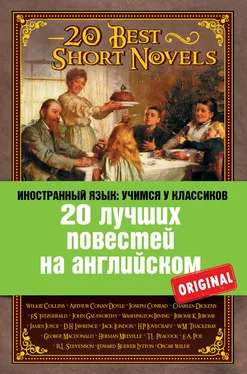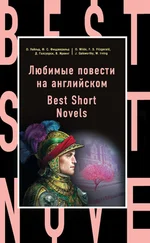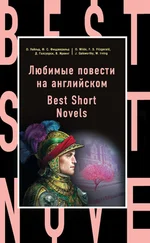‘“. . . Who was not his friend who had heard him speak once?” she was saying. “He drew men towards him by what was best in them.” She looked at me with intensity. “It is the gift of the great,” she went on, and the sound of her low voice seemed to have the accompaniment of all the other sounds, full of mystery, desolation, and sorrow, I had ever heard – the ripple of the river, the soughing of the trees swayed by the wind, the murmurs of the crowds, the faint ring of incomprehensible words cried from afar, the whisper of a voice speaking from beyond the threshold of an eternal darkness. “But you have heard him! You know!” she cried.
‘“Yes, I know,” I said with something like despair in my heart, but bowing my head before the faith that was in her, before that great and saving illusion that shone with an unearthly glow in the darkness, in the triumphant darkness from which I could not have defended her – from which I could not even defend myself.
‘“What a loss to me – to us!” – she corrected herself with beautiful generosity; then added in a murmur, “To the world.” By the last gleams of twilight I could see the glitter of her eyes, full of tears – of tears that would not fall.
‘“I have been very happy – very fortunate – very proud,” she went on. “Too fortunate. Too happy for a little while. And now I am unhappy for – for life.”
‘She stood up; her fair hair seemed to catch all the remaining light in a glimmer of gold. I rose, too.
‘“And of all this,” she went on mournfully, “of all his promise, and of all his greatness, of his generous mind, of his noble heart, nothing remains – nothing but a memory. You and I—”
‘“We shall always remember him,” I said hastily.
‘“No!” she cried. “It is impossible that all this should be lost – that such a life should be sacrificed to leave nothing – but sorrow. You know what vast plans he had. I knew of them, too – I could not perhaps understand – but others knew of them. Something must remain. His words, at least, have not died.”
‘“His words will remain,” I said.
‘“And his example,” she whispered to herself. “Men looked up to him – his goodness shone in every act. His example—”
‘“True,” I said; “his example, too. Yes, his example. I forgot that.”
“But I do not. I cannot – I cannot believe – not yet. I cannot believe that I shall never see him again, that nobody will see him again, never, never, never.”
‘She put out her arms as if after a retreating figure, stretching them back and with clasped pale hands across the fading and narrow sheen of the window. Never see him! I saw him clearly enough then. I shall see this eloquent phantom as long as I live, and I shall see her, too, a tragic and familiar Shade, resembling in this gesture another one, tragic also, and bedecked with powerless charms, stretching bare brown arms over the glitter of the infernal stream, the stream of darkness. She said suddenly very low, “He died as he lived.’
‘“His end,” said I, with dull anger stirring in me, “was in every way worthy of his life.”
‘“And I was not with him,” she murmured. My anger subsided before a feeling of infinite pity.
‘“Everything that could be done—” I mumbled.
‘“Ah, but I believed in him more than any one on earth – more than his own mother, more than – himself. He needed me! Me! I would have treasured every sigh, every word, every sign, every glance.”
‘I felt like a chill grip on my chest. “Don’t,” I said, in a muffled voice.
‘“Forgive me. I – I have mourned so long in silence – in silence. . . . You were with him – to the last? I think of his loneliness. Nobody near to understand him as I would have understood. Perhaps no one to hear. . . .”
‘“To the very end,” I said, shakily. “I heard his very last words. . . .” I stopped in a fright.
‘“Repeat them,” she murmured in a heart-broken tone. “I want – I want – something – something – to – to live with.”
‘I was on the point of crying at her, “Don’t you hear them?” The dusk was repeating them in a persistent whisper all around us, in a whisper that seemed to swell menacingly like the first whisper of a rising wind. “The horror! The horror!”
‘“His last word – to live with,” she insisted. “Don’t you understand I loved him – I loved him – I loved him!”
‘I pulled myself together and spoke slowly.
‘“The last word he pronounced was – your name.”
‘I heard a light sigh and then my heart stood still, stopped dead short by an exulting and terrible cry, by the cry of inconceivable triumph and of unspeakable pain. “I knew it – I was sure!” . . . She knew. She was sure. I heard her weeping; she had hidden her face in her hands. It seemed to me that the house would collapse before I could escape, that the heavens would fall upon my head. But nothing happened. The heavens do not fall for such a trifle. Would they have fallen, I wonder, if I had rendered Kurtz that justice which was his due? Hadn’t he said he wanted only justice? But I couldn’t. I could not tell her. It would have been too dark – too dark altogether. . . .’
Marlow ceased, and sat apart, indistinct and silent, in the pose of a meditating Buddha. Nobody moved for a time. ‘We have lost the first of the ebb,’ said the Director suddenly. I raised my head. The offing was barred by a black bank of clouds, and the tranquil waterway leading to the uttermost ends of the earth flowed sombre under an overcast sky – seemed to lead into the heart of an immense darkness.
Charles Dickens
A Christmas Carol
I have endeavoured in this Ghostly little book, to raise the Ghost of an Idea, which shall not put my readers out of humour with themselves, with each other, with the season, or with me. May it haunt their houses pleasantly, and no one wish to lay it.
Their faithful Friend and Servant, C.D.
December, 1843.
Marley was dead: to begin with. There is no doubt whatever about that. The register of his burial was signed by the clergyman, the clerk, the undertaker, and the chief mourner. Scrooge signed it. And Scrooge’s name was good upon ’Change, for anything he chose to put his hand to. Old Marley was as dead as a door-nail [188].
Mind! I don’t mean to say that I know, of my own knowledge, what there is particularly dead about a door-nail. I might have been inclined, myself, to regard a coffin-nail as the deadest piece of ironmongery in the trade. But the wisdom of our ancestors is in the simile [189]; and my unhallowed hands shall not disturb it, or the Country’s done for. You will therefore permit me to repeat, emphatically, that Marley was as dead as a door-nail.
Scrooge knew he was dead? Of course he did. How could it be otherwise? Scrooge and he were partners for I don’t know how many years. Scrooge was his sole executor, his sole administrator, his sole assign, his sole residuary legatee, his sole friend, and sole mourner. And even Scrooge was not so dreadfully cut up by the sad event, but that he was an excellent man of business on the very day of the funeral, and solemnised it with an undoubted bargain.
The mention of Marley’s funeral brings me back to the point I started from. There is no doubt that Marley was dead. This must be distinctly understood, or nothing wonderful can come of the story I am going to relate. If we were not perfectly convinced that Hamlet’s Father died before the play began, there would be nothing more remarkable in his taking a stroll at night, in an easterly wind, upon his own ramparts, than there would be in any other middle-aged gentleman rashly turning out after dark in a breezy spot – say Saint Paul’s [190]Churchyard for instance – literally to astonish his son’s weak mind.
Читать дальше
Конец ознакомительного отрывка
Купить книгу












